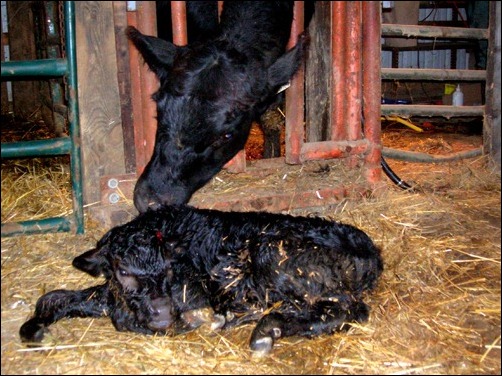Although veterinarians may not be involved in the day-to-day activities on a livestock farm, they are still a very important of the team.
Veterinarians are used more often on some types of farms than others. Many farmers will do their own preventative medications, like vaccines and anti-parasite treatments. Most vaccines are a simple injection, and many anti-parasite treatments are a pour-on treatment. (Anti-parasite medications are similar to the flea and tick preventative medication you might use on your dog or cat, just in a much bigger dose!) Farmers do need to have a close relationship with their veterinarians so they can get the training to administer these medications, and to get the medications.
Many dairy farms have a standing weekly appointment with their veterinarian. The vet will come out on the same day, at the same time to do pregnancy checks on all the cows that have been bred. (Cattle are “preg checked” by a quick rectal examination where the veterinarian will feel for a fetus inside the uterus.) This lets the farmer know if the cows are pregnant or not, and he can decide if he wants to try to breed them again or sell them. The vet will also check any sick cows that need attention while he is there. Of course, if there is an emergency between the scheduled visits, the vet will make an extra trip.
Other types of farms, like beef cattle farms or pig farms, may not have a veterinarian out on a regular basis. A beef cattle farmer may only call a veterinarian if he has a sick animal, or he may even wait until more than one are sick, if it is a mild illness. (You may not go to the doctor if only you are sick, but if more than one person in your house gets sick, everyone gets a trip to the doctor. It’s similar in veterinary medicine.)
One of the more common emergencies that veterinarians are called to see is an animal having trouble giving birth (called dystocia). Most animals can give birth without any assistance from people. But sometimes the baby is just a little too big, or their legs are caught in the wrong position. Many farmers know how to help their animals out, and may not need to call a vet for every dystocia. But every once in a while, the baby is harder to get “unstuck” than normal, and they’ll call out a vet. Usually the vet can move the baby around and get them out, but every once in a while they will need to do a Cesarean section (C-section). Lucky for us, we’re both veterinarians, so we get to do surgeries on our own cows. And then take care of the babies.
Turkey or chicken farms may have a veterinarian to the farm only rarely. Many times, the veterinarian meets with the farmer and reviews the farm’s records about food, weight gain, or egg production. With the farmer’s input and the records, the vet can make recommendations on nutrition or management changes that can improve the health and well-being of the animals without actually seeing them.
It may seem counter-productive that a veterinarian does not always visit a farm to make animal care recommendations. And believe it or not, the biggest reason for this is animal health! There are many diseases that can be carried from farm to farm on a person’s clothes, shoes, or even vehicle. If a veterinarians visits 3 farms in one day, it is possible that he can pick up a disease at the first farm and carry it to the other two farms he visits! We all take care to thoroughly clean our shoes, change coveralls, and sometimes even take showers before entering and after leaving a farm, but these precautions are sometimes not enough.
When do you take your dog or cat to the vet? What do you expect from your veterinarian when you are there?






I appreciate you mentioning that the most common emergencies for veterinary care are when an animal is having trouble giving birth. My grandpa has a farm and has a close relationship with his vet. Thanks for the information on how farmers and veterinarians work together.
It’s so important to keep a good relationship with your farm’s veterinarian. We can help with so many things, not just emergencies!